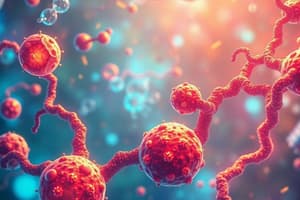Podcast
Questions and Answers
What is the primary goal of biochemistry?
What is the primary goal of biochemistry?
- To understand the molecular basis of life (correct)
- To focus on physics principles in living organisms
- To study the behavior of inorganic compounds
- To study chemical processes in non-living organisms
Which field does biochemistry combine to understand the molecular basis of life?
Which field does biochemistry combine to understand the molecular basis of life?
- Botany and Geology
- Astronomy and Cosmology
- Computer Science and Mathematics
- Chemistry, Biology, and Physics (correct)
What are the main compounds studied in biochemistry?
What are the main compounds studied in biochemistry?
- Silicon-based compounds
- Metal-based compounds
- Nitrogen-based compounds
- Carbon-based compounds (correct)
Which type of metabolism involves combining smaller molecules to form larger ones?
Which type of metabolism involves combining smaller molecules to form larger ones?
What is the role of catabolism in metabolism?
What is the role of catabolism in metabolism?
Which type of metabolites play roles in various biological processes apart from primary metabolites?
Which type of metabolites play roles in various biological processes apart from primary metabolites?
What is the main focus of bioenergetics in biological systems?
What is the main focus of bioenergetics in biological systems?
How do enzymes contribute to biochemical reactions?
How do enzymes contribute to biochemical reactions?
What key role do enzymes play in cellular processes?
What key role do enzymes play in cellular processes?
How has biochemistry contributed to our understanding of evolution?
How has biochemistry contributed to our understanding of evolution?
What does the equilibrium constant (Keq) determine in a reaction?
What does the equilibrium constant (Keq) determine in a reaction?
In biochemistry, what does ΔG represent for a reaction?
In biochemistry, what does ΔG represent for a reaction?
Flashcards are hidden until you start studying
Study Notes
Biochemistry: The Study of Life at the Molecular Level
Biochemistry is the study of the chemical processes that occur within living organisms. It is a multidisciplinary field that combines aspects of chemistry, biology, and physics to understand the molecular basis of life. The primary goal of biochemistry is to explain all life processes in molecular detail, as life processes are performed by organic molecules.
The Foundations of Biochemistry
Biochemistry is built upon the foundations of chemistry, particularly organic chemistry, which deals with the study of carbon-based compounds. These compounds include proteins, lipids, nucleic acids, and other primary metabolites, which are essential for the growth, maintenance, and reproduction of living organisms. Secondary metabolites, such as toxins and natural products, also play important roles in various biological processes.
Metabolism: The Building and Breaking Down of Life-Sustaining Chemicals
Metabolism is the collective set of chemical reactions that occur within an organism to maintain life. It can be broadly divided into catabolism and anabolism. Catabolism involves the breakdown of larger molecules into smaller ones, releasing energy and generating precursors for further reactions. Anabolism, on the other hand, combines smaller molecules to form larger ones, consuming energy and producing biologically useful compounds.
Bioenergetics: The Flow of Energy in Biological Systems
Bioenergetics is a sub-discipline of biochemistry that focuses on the flow of energy in biological systems. It uses principles from thermodynamics to explain the direction and equilibrium of metabolic reactions. The free energy changes (ΔG) associated with a reaction can be used to determine the thermodynamic favorability of a reaction and its equilibrium constant (Keq).
Enzymes: Catalysts for Biochemical Reactions
Enzymes play a crucial role in biochemistry as they act as catalysts for metabolic reactions. They increase the rate of reactions and allow cells to regulate the rate of metabolic processes in response to changes in the cellular environment. Enzymes are crucial for life as they facilitate a wide range of biochemical processes, from digestion and energy production to DNA replication and protein synthesis.
Biochemistry and Evolution
Biochemistry has significantly contributed to our understanding of evolution by providing insights into the molecular similarities and differences between organisms. The analysis of ribosomal RNA (rRNA) sequences has led to the construction of a highly accurate tree of life, showing the evolutionary relationship between all life forms. This has confirmed that all living organisms share common molecular mechanisms, such as replication, cellular structure, and energy utilization.
In summary, biochemistry is a vital field that seeks to explain the molecular basis of life. It combines principles from chemistry, biology, and physics to understand the chemical processes that occur within living organisms. Through the study of biochemistry, we gain a deeper understanding of the fundamental processes that sustain life and the evolutionary relationships between organisms.
Studying That Suits You
Use AI to generate personalized quizzes and flashcards to suit your learning preferences.




